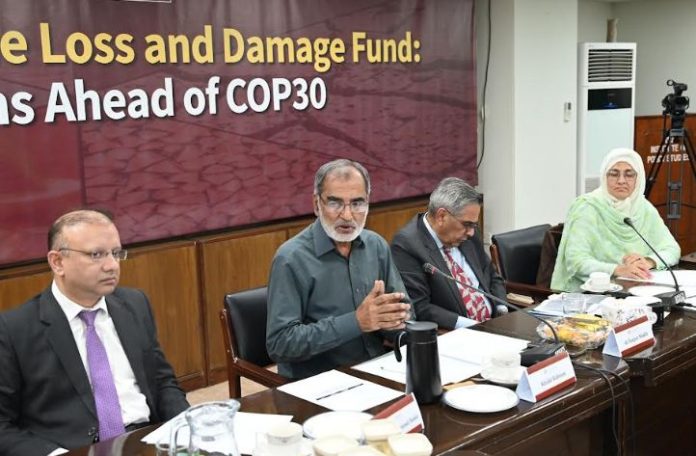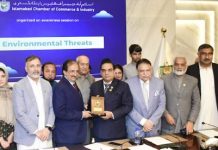ISLAMABAD, NOV 4 /DNA/ – As the global community gears up for COP30, Pakistan faces an urgent need to strengthen governance, institutional readiness, and local resilience, and clarify access mechanisms to effectively benefit from the Fund for Responding to Loss and Damage (FRLD). While the fund presents a critical opportunity for Pakistan, persistent gaps in governance, capacity, accreditation, and project preparedness continue to impede timely access.
Building climate resilience demands integrated planning, a better understanding of financing processes, bankable projects, and locally driven approaches. Without these, Pakistan risks remaining on the margins of emerging global climate finance flows, designed to compensate developing nations for climate-induced losses.
Climate experts stressed this during a roundtable titled ‘Operationalizing the Loss and Damage Fund: Expectations Ahead of COP30,’ held at the Institute of Policy Studies (IPS), Islamabad.
The event was addressed by Khalid Rahman, chairman IPS, AliTauqeer Shaikh, senior climate expert and FRLD board member, Afia Malik, senior energy economist, Muhammad Hammad Bashir, climate finance expert, Dr Saira Qaiser, director policy, Pakistan Academy of Science, Talha Tufail, research officer, Institute of Regional Studies, Dr Irfan Yousaf, climate expert and consultant, World Bank, and HamidSarfaraz, climate expert.
Speaking on the evolving global framework of the Loss and Damage Fund, Ali Tauqeer explained that loss and damage financing is distinct from mitigation and adaptation efforts, as it compensates developing countries for the costs of building resilience. He informed that direct budget support under the fund has been confirmed but remains non-operational, pending adoption of the risk management framework.
Tauqeer further pointed out that procedural obstructions are slowing direct access to the fund, and until national accreditation is achieved, countries will have to rely on multilateral entities for access. He emphasized that projects must demonstrate country ownership, measurable results, and complementarity with national systems, with 50 percent allocation for least developed countries and geographic balance as guiding principles.
Furthermore, Afia Malik highlighted that extreme weather events are already imposing heavy costs on Pakistan’s energy infrastructure. She pointed out that power distribution companies have not upgraded their systems to make them climate-resilient, emphasizing the need for climate risk assessments in procurement processes and least-cost planning that accounts for resilience.
Discussing Pakistan’s expectations from COP30, Hammad Bashir underlined that a limited understanding of international climate finance mechanisms hampers access to available resources. He stressed the importance of developing bankable projects and bridging the gap between available finance and local needs. He outlined the “Four As” critical to effective engagement with the Loss and Damage Fund: accessibility, additionality, adequacy, andaccountability, each necessary to ensure transparent, sufficient, and equitable climate finance.
Dr Saira Qaiser noted that funding criteria must be clearly communicated, as many stakeholders in Pakistan remain unaware of how to develop viable project proposals. She also emphasized the need to safeguard funds from exchange rate fluctuations and called for a holistic national strategy to build resilience. She further underscored that climate education should be strengthened to equip the next generation with the knowledge to navigate emerging climate finance mechanisms.
Talha Tufail emphasized the need for robust attribution studies that scientifically link emissions and their resulting impacts. Such evidence, he said, would strengthen Pakistan’s case when submitting projects to international climate funds.
Arguing about Pakistan’s vulnerability to climate change, Dr Irfan Yousaf pointed out that the challenge lies in the lack of preparedness. He noted that gaps in education, mindset, and institutional readiness hinder effective responses to climate extremes. Instead of relying solely on external funds, he urged a stronger focus on building local resilience through understanding national vulnerabilities and capacities.
Endorsing this, Hamid Sarfaraz observed that the accredited entities under the FRLD are the same ones that struggled to deliver under the Green Climate Fund. He lamented that current access remains dominated by multilateral agencies such as the ADB and the World Bank. He argued that this approach limits local benefits and reiterated the need to prioritize indigenous resilience-building efforts.
In his concluding remarks, Khalid Rahman underscored that Pakistan’s effective engagement with the Loss and Damage Fund depends on proactive preparation, good governance, and institutional strengthening. He emphasized the importance of designing a coherent national strategy that bridges policy, technical, and financial dimensions to build sustainable climate resilience.

















